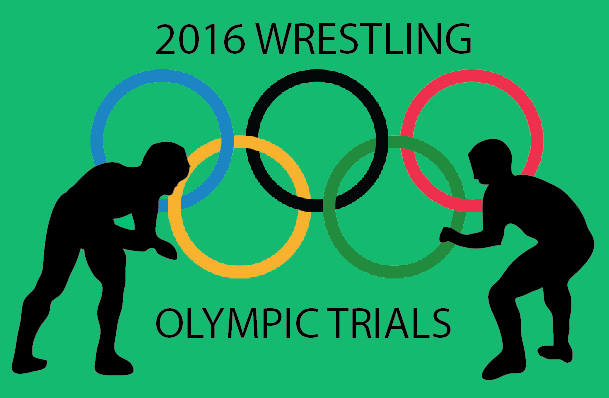Wrestling Olympic Trials return to Iowa City
Iowa City hosts the 2016 USA Wrestling Olympic Trials for the second time.
April 8, 2016
The best men and women wrestlers in the nation return to Iowa City April 9 and 10 to qualify for the 2016 Summer Olympic Games in Rio de Janeiro. The last time Iowa City hosted the event for the 2012 London Summer Olympic Games, the trials attendance record was shattered, with 54,766 in attendance over the course of two days.Competition starts at 9 a.m. at Carver Hawkeye Arena on Saturday and Sunday.
Twenty-one wrestlers that either grew up in Iowa, wrestled here for college or train here now will be wrestling here this weekend. Big names include University of Iowa grads Tony Ramos, Brent Metcalf, Bobby Telford, Daniel Dennis and current University of Iowa wrestler Sam Stoll. Jake Varner, London 2012 Olympic gold medalist and a national champion for Iowa State University will also be wrestling.
Looking to go watch?
Wrestling takes place on Saturday April 9th and Sunday the 10th at Carver Hawkeye Arena in Iowa City. The two days are split between certain weights, so that wrestlers only wrestle one day.
Price of admission
Single-Day Ticket Prices:
ADULT – $45 YOUTH (18 & under) – $35
Single-Session Ticket Prices:
ADULT – $30 YOUTH (18 & under) – $25
Saturday, April 9
Weights to be wrestled
Men’s freestyle (65 kg and 125 kg)
Women’s freestyle (58 kg, 63 kg and 69 kg)
Greco-Roman (59 kg, 66 kg, 85 kg and 98 kg)
Schedule
8:00 a.m. – Doors open at Carver Hawkeye Arena for spectators.
9:00 a.m. to 2:30 p.m. – First session (Preliminaries through Challenge Tournament finals)
5:00 p.m. – Doors open to Carver-Hawkeye Arena for the second session.
6:00 p.m. to 9:00 p.m. – Second session (Best two of three Championship Series)
Sunday, April 10
Weights to be wrestled
Men’s freestyle (57 kg, 74 kg, 86 kg, 97 kg)
Women’s freestyle (48 kg, 53 kg, 75 kg)
Greco-Roman (75 kg and 130 kg)
Schedule
8:00 a.m. – Doors open at Carver Hawkeye Arena for spectators.
9:00 a.m. – 2:30 p.m. – First session (Preliminaries through Challenge Tournament finals)
5:00 p.m. – Doors open to Carver-Hawkeye Arena for the second session.
6:00 p.m. – 9:00 p.m. – Second session (Best two of three Championship Series)
What you need to know
If you’ve ever been to a wrestling meet at the University of Iowa, you’ve probably watched a Folkstyle match, the style wrestled here in the U.S. Olympic wrestling is a little different. Here are a few things you need to know to make the most of your Olympic Trials experience.
Olympic weights and styles
At the Olympic level, men wrestle two styles of wrestling–Greco-Roman and freestyle. Women only wrestle freestyle. Each style has six different weights.
Men’s freestyle weights: Men’s Greco-Roman weights: Women’s weights:
57 kg 59 kg 48 kg
65 kg 66 kg 53 kg
74 kg 75 kg 58 kg
86 kg 85 kg 63 kg
97 kg 98 kg 69 kg
125 kg 130 kg 75 kg
Olympic scoring system and match structure
Takedowns and throws
In both and Greco, from the standing position if one wrestler secures control over the other without exposing the defensive wrestler’s back to the mat, two points are awarded to the wrestler who gained control.
If the defensive wrestler’s back is exposed to the mat upon the takedown (also known as a throw), the offensive wrestler receives four points. But in Greco, if the throw has great amplitude (usually feet over head) and puts the defensive wrestler in danger of being pinned, then the offensive wrestler receives five points. Five point throws are only in Greco, not freestyle.
*Spectator tip: When officiating an international style of wrestling, referees start counting on their thumb, not their pointer finger. So, when two points is awarded, the referee will hold up their thumb and pointer finger.
Reversals
When one wrestler is in the top position and has already been awarded the takedown, the other wrestler can reverse him and score one point for himself.
Technical Falls
A technical fall is when a wrestler gains a certain number of points over the other, the match is over. This is also called the mercy rule. In Freestyle this certain amount of points is ten and in Greco it is eight points. Once the point deficit reaches either of these numbers, the match is stopped and the more point productive wrestler wins.
Falls/Pins
A fall, otherwise known as a pin, can stop the match no matter the point deficit or the period. The wrestler who can force the other’s shoulder blades to the mat is granted the fall.
Push out rule
If a wrestler steps outside of the mat one point may be awarded. If the wrestler who stepped out is determined to be fleeing the mat, the other wrestler is awarded the point. If the wrestler is pushed out of bounds with the other wrestler having an intent to stall the match, the wrestler pushed out gets the point.
Match time
Olympic wrestling matches, no matter the style, last for six minutes, split into two, three minute periods.
Challenges
Each wrestler is allowed challenges in a match. To signal a challenge to a certain call, the coach throws a block onto the mat that coordinates with their wrestler’s singlet color (red or blue). The challenge must be signaled within five second of the call that is being challenged. The match is then stopped and there is a video review conducted by the official jury or the head referee. The challenge can either be confirmed and the call on the mat overturned, or the call on the mat can be confirmed and the mat continues.
Sources:
http://content.themat.com/forms/Rulebook.pdf
https://docs.google.com/document/d/1ZXYP9ZG_rFRH6hRglZMrAp8rtjn1yE1NxaOjl4w0dus/edit?pli=1
Graphic by Isabelle Robles.






